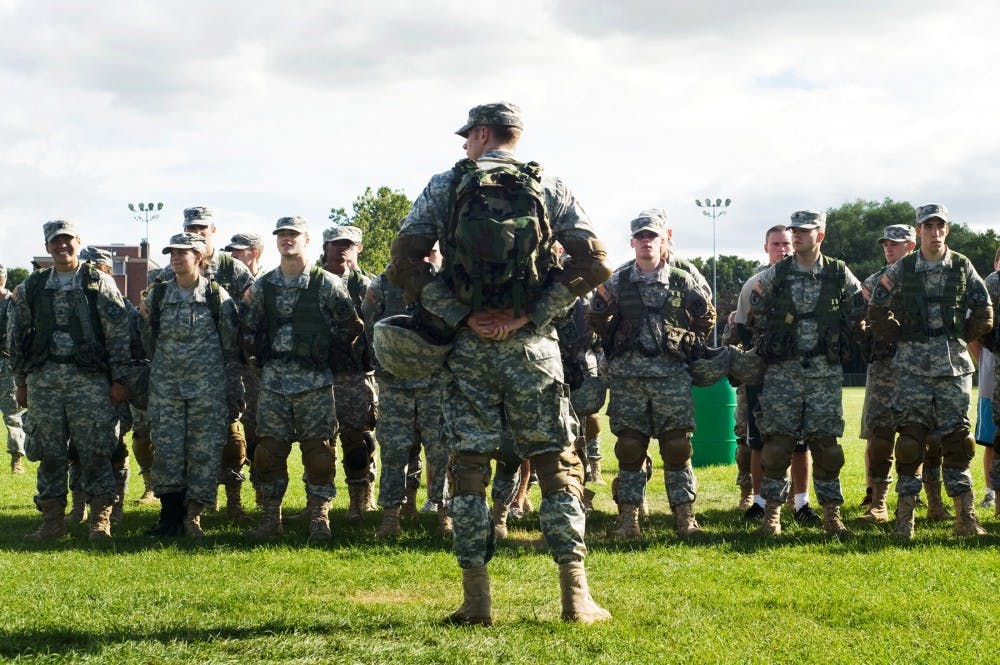When Andrew Cross headed to Iraq for the first time, he was the 23-year-old black sheep of his family.
In a family of doctors and other medical professionals, Cross said he never got over the GI Joe phase from childhood — and he decided to enlist.

When Andrew Cross headed to Iraq for the first time, he was the 23-year-old black sheep of his family.
In a family of doctors and other medical professionals, Cross said he never got over the GI Joe phase from childhood — and he decided to enlist.
Cross is one of the many MSU students who have served in Iraq or Afghanistan during the more than eight years of conflict.
On Friday, U.S. President Barack Obama said he will be bringing the war in Iraq to a “responsible end,” as tens of thousands of troops will return home during the next two months.
This year also marks the 150th anniversary of the beginning of the American Civil War — a pivotal turning point in American history.
Though both influential, being a student in the time of war has changed dramatically. But for some, the honor to serve remains the same.
A service of sacrifice
Since a number of ROTC students were under the age of 10 when the Sept. 11 attacks happened, Lt. Col Jeff McDonald, a chairperson for the Department of Military Science, said being a country at war is all many of them know.
“They were only 10 and didn’t have any thought on what the world would be,” he said. “They know we’re a country at war; they don’t know anything else.”
MSU in wartime looks a lot different than it did 150 years ago. Tuition has increased by the thousands — averaging about $12,800 per semester — and the university hosts about 47,000 students, admitting its largest freshman class ever in 2011, a class of about 7,800 students.
And the toll on soldiers is different as well. After spending a year in Iraq and seeing many of his friends return home with post-traumatic stress disorder, Cross knows the scars war can leave behind.
Cross said he experiences some “very light” post-traumatic stress disorder, namely anxiety from being in large crowds, but recognizes others have it much worse.
“If you think about it too much it depresses you … take(s) you down to a place you don’t want to be,” he said.
The danger Cross dealt with in Iraq as a cadet tasked with roadside bombs is something he still hasn’t told his mother about to prevent her from anxiety.
Nevertheless, he said his experience in the military helped him grow up and ultimately brought his family closer together.
“I’m a very different person than I was going in,” Cross said. “I shed away a lot of the frivolous qualities (and) the immaturity, (and) we grew closer together as a family.”
In the face of adversity and fear, Cross said his biggest concern was his wife, who he was able to return to for the birth of their now 2-year-old daughter.
Today, Cross said he hopes to return to combat as an officer after graduating and said he lives by the military slogan: “For those I love, I will sacrifice.”
“I’m perfectly fine with getting shot or hit with an (improvised explosive device) because I’m protecting our countries freedoms,” he said. “The people that can’t imagine doing that are probably pretty grateful there are people like me who are willing to do that.”
Letting them go
Support student media! Please consider donating to The State News and help fund the future of journalism.
In 1861, MSU — then known as the State Agricultural College — was in a state of uncertainty.
According to the MSU Archives, at the time many young men were gearing up to serve in the American Civil War. The university was transitioning from a two-year to a four-year institution and was struggling to retain a student population.
With about 40 students enrolled, the college was under pressure to prove it was worthy of its valuable land grant, as the University of Michigan was persistent in its effort to have the college transferred to Ann Arbor.
The attitude surrounding the university was different then with the university prohibiting the use of alcohol, tobacco and playing cards and requiring all students to attend weekly religious services, according to MSU documents.
Tuition was free to all in-state students, with rent costing $4 a year and food costing $2 per week in addition to a five-dollar matriculation fee.
As the first graduating class — consisting of seven men — was scheduled to complete their degrees, the Federal Army was in desperate need of topographical engineers.
The class had knowledge of science the army desperately needed, and because the state of Michigan was staunchly against slavery at the time, all seven students wanted to enlist.
Despite the stress surrounding enrollment, the faculty reluctantly allowed their senior class to leave school two months before graduation.
One board member at the time wrote of the decision “(If it had not been) that their education might fit them for posts hard to fill, I doubt if I could have voted to let them go.”
As a result in Nov. 1861, the university’s first commencement contained not a single student, as all were serving in the military. McDonald said the university’s heritage adds to the sense of pride for students in the MSU Army ROTC.
“We have a rich history that dates back to the beginning of the university, and most of the ROTC students can recite that history,” McDonald said. “We are not the military academy, but like them, we can point to having that long history of service and what this university represents.”